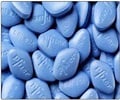There is widespread concern about "over-medication" of soldiers returning from combat, the US Army's surgeon general said on Monday adding the military is closely tracking how drugs are prescribed to troops.
The top medical officer in the army, Lieutenant General Eric Schoomaker, said the increasing use of prescription drugs for soldiers recovering from combat duty in Iraq or Afghanistan reflected a wider trend in the country to treat pain primarily through medication.But he told reporters: "I can tell you that we are concerned about over-medication."
The general said that "we're very concerned about the panoply of drugs that are being used and the numbers of drugs that are being used."
"We are monitoring it very, very closely," he said.
Prescription orders for psychiatric and pain medicines for troops have increased dramatically since 2001, according to a Military Times report in March, with one in six service members on some form of psychiatric drug.
About 15 percent of soldiers said they had abused prescription drugs in the past month, according to a Pentagon survey carried out in 2008 and released in December.
Advertisement
Schoomaker said he had led a review looking at prescription drugs and his task force had promoted alternatives to pain killers, including "yoga, meditation, acupuncture, movement therapy, lots of other ways of approaching pain management."
Advertisement
The Times, citing interviews with soldiers and health care workers, described the "warrior transition unit" at Fort Carson and similar posts as "warehouses of despair, where damaged men and women are kept out of sight, fed a diet of prescription pills and treated harshly by noncommissioned officers."
But Schoomaker said about 81 percent of all soldiers at the transition centers expressed satisfaction with their treatment and about 90 percent of the troops at the Fort Carson center said they were satisfied with the care they received.
"And even with 90 percent satisfaction you're going to have some people with very complex problems that are not going to be in that satisfied group," he said, referring to the Times report.
About 26 percent of the soldiers at the transition center in Fort Carson were on a prescribed narcotic, with a clinical pharmacist closely monitoring the prescriptions, Colonel Jimmie Keenan of the military hospital at Fort Carson, told reporters by telephone.
Source-AFP
RAS









